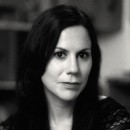Jennifer Foerster
Poetry

- Biography
Biography
Jennifer Elise Foerster is the author of three books of poetry, Leaving Tulsa (2013), Bright Raft in the Afterweather (2018), and The Maybe-Bird (2022), and served as the Associate Editor of When the Light of the World Was Subdued, Our Songs Came Through: A Norton Anthology of Native Nations Poetry. She is the recipient of a NEA Creative Writing Fellowship, a Lannan Foundation Writing Residency Fellowship, a Hermitage Artist Retreat Fellowship, and was a Wallace Stegner Fellow in Poetry at Stanford. Her poetry has recently appeared in POETRY London, The Georgia Review, Kenyon Review and other journals. Jennifer currently teaches at the Rainier Writing Workshop, the Institute of American Indian Arts Continuing Education Program, and is the Literary Assistant to the U.S. Poet Laureate, Joy Harjo. She Foerster grew up living internationally, is of European (German/Dutch) and Mvskoke descent, and is a member of the Muscogee (Creek) Nation of Oklahoma. She lives in San Francisco.
Mentor. Workshops and classes in poetry.
Statement: “Poetry can expand, challenge, and deepen our ways of knowing. Adrienne Rich wrote: “Poems are like dreams: in them you put what you don’t know you know.” I believe my work with you is only to serve as a guide, to encourage you towards what you don’t know you know, and to inspire you to grow deeper into your potential as a writer. Poetry is especially vital in today’s world; my teaching work is to challenge you towards your own understanding of why. The basis of a workshop or mentorship is exploring why you write—and read—poetry. I will encourage you to follow the areas of poetics and the poets you are interested in as well as the poetics and poets you resist. We can only deepen our poetics by understanding our resistances. Poetry is all transformation; pursuing poetry means we are open to change. In my teaching, I will encourage you in taking creative, imaginative risks, and will ask you to consider your strengths and weaknesses both as points of departure. I don’t believe art is made by getting comfortable in a voice or style. If poetry is going to be a life-long endeavor, we must practice becoming comfortable with its surprises and its failures, and, most of all, being excited by its questions.”



Social Media